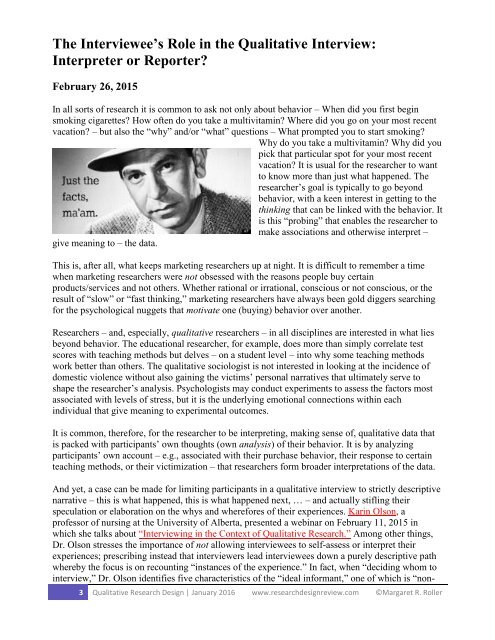Qualitative Research Design
Qualitative Research Design-2015
Qualitative Research Design-2015
Create successful ePaper yourself
Turn your PDF publications into a flip-book with our unique Google optimized e-Paper software.
The Interviewee’s Role in the <strong>Qualitative</strong> Interview:<br />
Interpreter or Reporter?<br />
February 26, 2015<br />
In all sorts of research it is common to ask not only about behavior – When did you first begin<br />
smoking cigarettes? How often do you take a multivitamin? Where did you go on your most recent<br />
vacation? – but also the “why” and/or “what” questions – What prompted you to start smoking?<br />
Why do you take a multivitamin? Why did you<br />
pick that particular spot for your most recent<br />
vacation? It is usual for the researcher to want<br />
to know more than just what happened. The<br />
researcher’s goal is typically to go beyond<br />
behavior, with a keen interest in getting to the<br />
thinking that can be linked with the behavior. It<br />
is this “probing” that enables the researcher to<br />
make associations and otherwise interpret –<br />
give meaning to – the data.<br />
This is, after all, what keeps marketing researchers up at night. It is difficult to remember a time<br />
when marketing researchers were not obsessed with the reasons people buy certain<br />
products/services and not others. Whether rational or irrational, conscious or not conscious, or the<br />
result of “slow” or “fast thinking,” marketing researchers have always been gold diggers searching<br />
for the psychological nuggets that motivate one (buying) behavior over another.<br />
<strong>Research</strong>ers – and, especially, qualitative researchers – in all disciplines are interested in what lies<br />
beyond behavior. The educational researcher, for example, does more than simply correlate test<br />
scores with teaching methods but delves – on a student level – into why some teaching methods<br />
work better than others. The qualitative sociologist is not interested in looking at the incidence of<br />
domestic violence without also gaining the victims’ personal narratives that ultimately serve to<br />
shape the researcher’s analysis. Psychologists may conduct experiments to assess the factors most<br />
associated with levels of stress, but it is the underlying emotional connections within each<br />
individual that give meaning to experimental outcomes.<br />
It is common, therefore, for the researcher to be interpreting, making sense of, qualitative data that<br />
is packed with participants’ own thoughts (own analysis) of their behavior. It is by analyzing<br />
participants’ own account – e.g., associated with their purchase behavior, their response to certain<br />
teaching methods, or their victimization – that researchers form broader interpretations of the data.<br />
And yet, a case can be made for limiting participants in a qualitative interview to strictly descriptive<br />
narrative – this is what happened, this is what happened next, … – and actually stifling their<br />
speculation or elaboration on the whys and wherefores of their experiences. Karin Olson, a<br />
professor of nursing at the University of Alberta, presented a webinar on February 11, 2015 in<br />
which she talks about “Interviewing in the Context of <strong>Qualitative</strong> <strong>Research</strong>.” Among other things,<br />
Dr. Olson stresses the importance of not allowing interviewees to self-assess or interpret their<br />
experiences; prescribing instead that interviewers lead interviewees down a purely descriptive path<br />
whereby the focus is on recounting “instances of the experience.” In fact, when “deciding whom to<br />
interview,” Dr. Olson identifies five characteristics of the “ideal informant,” one of which is “non-<br />
3 <strong>Qualitative</strong> <strong>Research</strong> <strong>Design</strong> | January 2016 www.researchdesignreview.com ©Margaret R. Roller


